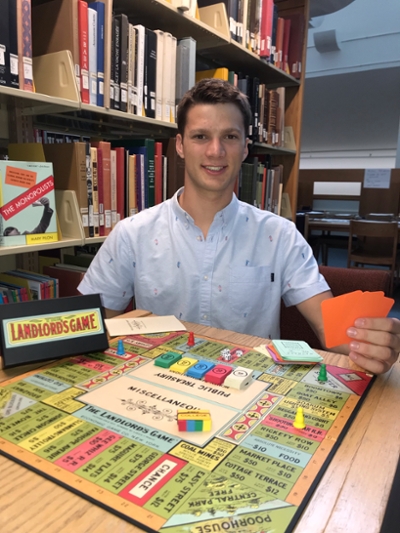“Who Wouldn’t Want to Play Games for the Summer?”
By Tom PorterEric Hall ’20 enjoys playing board games. He is also passionate about history, which is why he applied for a Gibbons Research Fellowship to explore the teaching of history using board games. Games may fun, he says, but they can also have a serious role to play in the classroom.

Eric Hall writes:
This past summer, I was fortunate enough to have the opportunity to work with Professor of History Patrick Rael as a Gibbons Research Fellow. Our work touched on a variety of topics, but the central focus was always the same: board games. My task for the summer was to help Professor Rael develop the first-year seminar that he will be teaching in the fall, titled Serious Games (HIST 1024/ DCS 1024). In the beginning of the summer, I took a course on GIS and honed my skills, since board games, like maps, attempt to convey lots of data through visual design. This helped me transition into my first project of the summer, recreating The Landlord’s Game. There’s a fascinating backstory here about a leftist board game designer from the early twentieth century called Elizabeth Magie. She created The Landlord’s Game to illustrate the flaws of capitalism and landlords, while creating a set of rules that underscored the benefits of socialism.
Her game did not become a commercial success until it was rebranded and sold by Charles Darrow to Parker Brothers as the much more well-known game Monopoly. The dubious origins of Monopoly and Magie were kept under wraps for decades, until a left-leaning economics professor created a game called Anti-Monopoly. His court battles caused Magie and the history of The Landlord’s Game to surface, as he fought the Parker Brothers’ monopoly on Monopoly. The original copies and rules of The Landlord’s Game are few and far between, but through my research I helped recreate a set to be played in class.
After wrapping up the story of Magie, I dove into creating some cards for a Lewis and Clark- themed game, which will help introduce first year students to the world of cooperative games and demonstrate how the objectives of historical games (i.e., to win) matter in portraying the historical arguments they make.
Board games, like other media such as films or books, make historical arguments. My task this summer was to research the historical literature behind the games, and develop my own interpretations of the arguments that each game was making. I’ve learned a lot about the importance of analyzing games. Board games are not innocent unbiased portraits of history—like actual history, they are messy stabs at how the game designer views the past and the present.
I chose this fellowship because I knew it’d be a blast to play a lot of board games over the summer with Professor Rael, and also because of my desire to see how board games can be used in a teaching setting. As opposed to trying to get to students through a book or a film, I want to see how a board game can teach and ask important questions. Who wouldn’t want to play games for a summer?